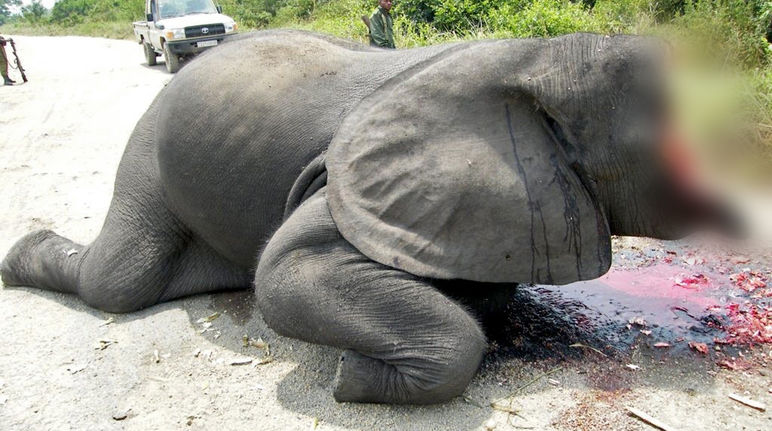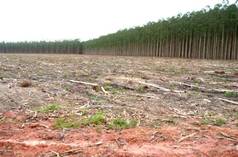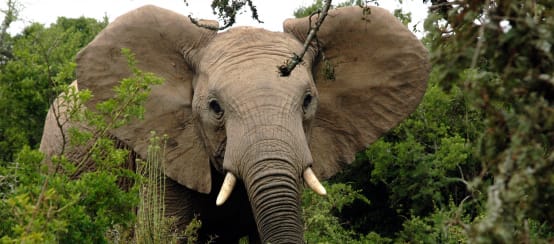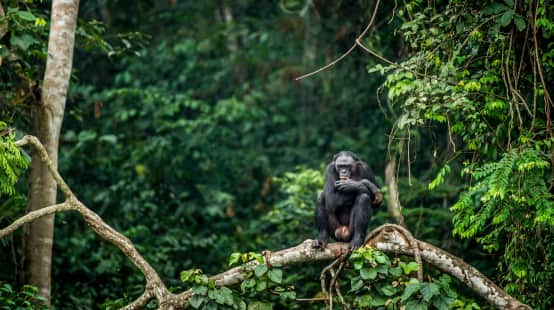L'UE deve porre fine al commercio di avorio, subito!
 Immagine recente di bracconaggio – l’avorio è commerciato come antiquariato nella UE (© Virunga Nationalpark, DR Kongo)
Immagine recente di bracconaggio – l’avorio è commerciato come antiquariato nella UE (© Virunga Nationalpark, DR Kongo)
L'UE è profondamente implicata nel commercio di avorio. Tonnellate di avorio sono state importate, esportate e commercializzate sul suo territorio. L’Europa, per questo, aiuta gli assassini di elefanti. Facciamo appello per un divieto totale del commercio di avorio, anche in Europa!
News e aggiornamenti LetteraCA: Alla Commissione Europea e ai governi degli Stati membri
“Il commercio di avorio deve essere vietato all’interno e al di fuori della UE. Il bracconaggio finirà solo abbandonando il marketing che lo sostiene.”
L'idea che l'Europa non avrebbe nulla a che fare con il commercio di avorio è falsa. In realtà, è tutto il contrario: l'Europa fa da perno nella relazione esistente tra gli elefanti cacciati in Africa e l’avorio venduto in Asia e svolge un ruolo centrale nel commercio legale e illegale di avorio.
La vendita, importazione ed esportazione di avorio antico è legale in Europa. Una vera manna per i criminali. L'esistenza di un mercato legale permette loro di vendere avorio frutto del bracconaggio illegale.
L’avorio è per questo disponibile apertamente nella UE, nelle vendite all'asta, nei negozi e su internet. Alcune aziende europee sono anche specializzate nell'acquisto e l'esportazione di avorio in Asia: negli ultimi anni, più di sette tonnellate di avorio e 12.000 sculture in avorio sono state vendute solo per i clienti Hong Kong.
E’ difficile stabilire quanto avorio illegale di avorio passa attraverso l'Unione Europea, e la stessa difficoltà è nello stabilire il reale numero di elefanti uccisi.
La comunità internazionale ha chiesto a tutti i governi di porre fine al proprio mercato interno di avorio, questo è emerso nelle ultime importanti conferenze della CITES e della IUCN. La Commissione Europea dimostra resistenza nel bandire il commercio totale di avorio, interferendo con gli sforzi per salvare gli elefanti a livello globale.
Esigiamo il divieto totale e il commercio di avorio senza restrizioni all'interno e all'esterno dell'UE. Questo è l'unico modo per fermare il bracconaggio di massa che subiscono gli elefanti.
Informazioni
La petizione originale viene dall’ organizzazione Pro Wildlife. Qui di seguito la lettera originale in inglese:
I am calling on the Commission and Member States of the European Union to ban all exports and imports of ivory and to close the EU’s domestic ivory market. The international community at the recent CITES conference and at the IUCN World Congress adopted two resolutions, calling on all governments to close their domestic ivory markets.
The EU maintains an active ivory market for “pre-convention” ivory, and is the biggest exporter of ivory to China and Hong Kong, with exports of worked ivory experiencing an alarming increase in the last two years. The legal trade enables that ivory from poached elephants is laundered. It fuels demand and corruption. Moreover, EU Member States are clearly being used as transit countries to smuggle illegal ivory from elephants poached in Africa to Asia. Huge shipments have been seized in EU Member States recently and ivory is on top of the list of seized wildlife products in the EU.
As actions are increasingly being taken around the world to close domestic ivory markets and destroy stockpiles of seized and confiscated ivory, I am urging the EU to take responsibility to end its own role in the ivory trade.
Lettera ai Ministri dell'Ambiente della UE
Molte associazioni per i diritti degli animali hanno inviato una lettera aperta ai Ministri dell'Ambiente degli Stati membri dell'Unione Europea. Salviamo la Foresta ha anch’essa sottoscritto la lettera (in inglese)
Dear minister,
We the undersigned 51 organisations, are writing to request that your government strongly support a closure of all ivory markets in the European Union and the implementation of a ban on all ivory (re-) exports and imports.
Africa’s elephants are in crisis. New status reports released in September show that across Africa, both forest and savannah elephant numbers have declined to an all-time low and are continuing to fall. Based on survey results, one third of savannah elephants have been poached for their ivory within the past 8 years.
The continued legal trade in ivory, whether domestic or international, threatens the very existence of African and Asian elephants in the wild. Legal domestic markets enable illegal trade by serving as a cover for trade in illicit ivory, including within the EU. Ivory markets fuel demand and, in turn, poaching. They also drive corruption, undermine the rule of law, and have been linked to terrorist and militia funding.
Elephant poaching and ivory trafficking won’t stop while legal domestic markets for ivory remain open. The international community has recognized this and with support from EU Member States just adopted two important resolutions at the Conference of the Parties to CITES (the Convention on International Trade in Endangered Species) and at the IUCN World Conservation Congress, calling on all governments to close their domestic ivory markets.
Crucially, China, the world’s largest destination for ivory, has committed to close its domestic ivory market and Hong Kong SAR has also promised to take steps to close its domestic ivory market. Failure on the part of the EU to close its own domestic ivory market could undermine these important developments.
Ivory remains on sale in many EU countries in markets, auctions, antique shops and online. Some EU countries maintain small, but active carving operations. EU regulations only permit the sale of antique or so-called pre-Convention ivory that was acquired before elephants were included on the CITES appendices. There is evidence, however, that new, illegal ivory is being laundered into trade using this exemption, that ivory pieces are being treated to look antique, and that forged permits are in circulation. At the same time, EU Member States are clearly being used as transit countries to smuggle illegal ivory from elephants poached in Africa to Asia. This is evidenced by recent large seizures, including 1.2 tons in Germany and more than 600 kg in France this year, both destined for Vietnam.
In addition, the EU continues to be the largest exporter of ivory claimed to be “pre-Convention” to Asia, with ivory ending up in the same markets and with the same dealers that are selling poached ivory. Data from the Hong Kong Government shows that a total of 7.3 tons was imported mostly from EU countries in 2014 and 2015. Moreover, the number of worked ivory pieces increased by a dramatic 685% from 1,572 pieces in 2014 to 10,761 pieces in 2015. We are deeply concerned that such exports of raw and worked ivory from the EU counteract efforts to reduce trafficking and demand, and are providing a route through which poached ivory is laundered, thus fuelling illegal trade.
Based on the Commission’s Action Plan against Wildlife Trafficking, the Council of the European Union - on 21 June this year - urged Member States not to issue export or re-export documents for raw pre-Convention ivory from elephants on the basis of EU guidelines. The Council also urged Member States to consider further measures to put a halt to commercial trade in elephant ivory. To exclusively end the export of raw ivory however, will be wholly inadequate. The EU urgently needs to implement a comprehensive, legally binding ban on all ivory exports and domestic sales. This would be in line with the recent IUCN motion and CITES resolution.
As actions are increasingly being taken around the world to close domestic ivory markets and destroy stockpiles of seized and confiscated ivory, the world now looks to the EU to take responsibility to end its own role in the ivory trade. France has already issued a ban on domestic sales and exports and the Netherlands has recently declared its intention to do the same. While the EU has been a leader in supporting efforts to crack down on the illegal ivory trade and reduce demand for ivory in other important consumer or transit countries, it is clearly lagging behind when it comes to closing its own domestic ivory market and banning exports.
We urge your government and the EU as a whole to now show leadership by closing down domestic ivory trade as well as banning all exports.
Your strong stance on this issue is essential to halt the decline in elephants, and to reverse the current trend towards extinction. We look forward to your reply.
CA: Alla Commissione Europea e ai governi degli Stati membri
Signor Presidente della Commissione Europea,
Illustri Signore e Signori Commissari
Illustri Signore e Signori Capi di Stato degli Stati membri,
Vi chiedo, in quanto rappresentanti della Commissione Europea e rappresentanti degli Stati membri di vietare l'importazione, l'esportazione e il commercio di avorio nella UE.
Durante l'ultima conferenza CITES e l'ultimo Congresso Mondiale IUCN, la comunità internazionale ha approvato due risoluzioni che chiedono a tutti i governi di porre fine al commercio di avorio nei loro paesi.
L'UE, tuttavia, continua ad essere un mercato attivo per l'avorio ed è il più grande esportatore di avorio verso la Cina ed Hong Kong. L'esportazione di avorio scolpito è aumentata ed ha raggiunto un livello allarmante negli ultimi due anni.
Il commercio legale di avorio rende possibile il riciclaggio di avorio degli elefanti cacciati dai bracconieri. Questo aggrava la corruzione e aumenta la domanda. Gli Stati europei servono da transito per il contrabbando illegale di avorio in Africa e in Asia. Le grandi partite sequestrate sono aumentate di recente nei paesi dell'Unione. L’avorio è il prodotto di origine animale più sequestrato.
In tutto il mondo, i governi rafforzano le loro misure per chiudere il loro mercato interno di avorio locale e per distruggere le scorte esistenti di avorio sequestrato. Vi esorto pertanto a farvi carico di questa responsabilità e di porre fine al commercio di avorio.
Distinti saluti








 Risultati recenti
Risultati recenti